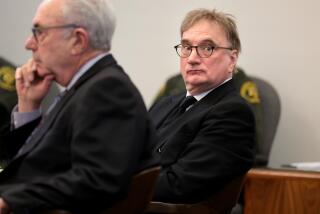Zelig Guilty of Slaying Former Wife at Courthouse
- Share via
A jury dominated by women convicted a Woodland Hills physician of first-degree murder Thursday, rejecting his claim that his former wife’s obsessive hounding for alimony and support drove him to shoot her to death at the downtown civil courts building.
Debate over what was on Harry Zelig’s mind when he pulled out a pistol as he rode up a courthouse escalator consumed the jury of nine women and three men for more than two days. A single shot caught Eileen Zelig in the neck, nicking her jugular vein as she clutched the hand of the couple’s 6-year-old daughter, Lisa. She died four hours later.
For the record:
12:00 a.m. March 8, 1997 For the Record
Los Angeles Times Saturday March 8, 1997 Valley Edition Metro Part B Page 3 Metro Desk 1 inches; 30 words Type of Material: Correction
Zelig judge--A Feb. 28 story in The Times about Harry Zelig, a Woodland Hills physician convicted of murdering his former wife, incorrectly identified the judge presiding over the case. The judge was Edward A. Ferns.
In the end, Deputy Dist. Atty. Steven Slavitt said, jurors agreed that Zelig was a cold, selfish man who would do anything to avoid his responsibility--first, for supporting his family, and then acting in a way that left his three children without a mother or father.
Slavitt said jurors told him that among the most compelling evidence was Zelig’s arrogance, reflected by his own words before and after the crime.
Weeks before the Sept. 1, 1995, shooting, Zelig wrote his wife that he would do anything, even go to jail, to avoid paying her. He wrote she could “chase [him] around the planet [but] she’s not getting another penny.”
On the witness stand, Zelig portrayed himself as a stressed-out, ailing wimp, pushed to the brink by an obsessed woman who hounded him for money and taunted him about his sexual impotence. But he never explained why he pulled the gun from his suit jacket, pointed it and fired.
“At that point, it was God’s roll of the dice, and here we are,” Zelig had said in explanation.
“Here was a man who would not take responsibility,” Slavitt said. “It wasn’t God’s roll of the dice. It was Harry Zelig’s actions. Some of the jurors told me that really bothered them.”
Zelig, 50, killed his wife after meeting her at the courthouse for what turned out the be the last of many hearings in their two-year divorce battle, which lawyers compared to the plot of the film, “The War of the Roses.”
The previous day, she had persuaded authorities to impound Zelig’s car--a battered sedan with the vanity tag “DR HARRY”--until he made about $4,000 in past-due support payments. He filed court papers to get the vehicle back.
Zelig, a former consultant to the state Medical Board, the licensing agency for physicians, never denied shooting his wife. But he sought a conviction on a lesser offense, such as second-degree murder or manslaughter, claiming he had acted in the heat of passion.
Defense attorney Ed Rucker argued that Zelig was plagued by health and financial problems, and snapped as his former wife continued to hound him for money. He said that had Zelig planned the killing, he would never have done it in front of dozens of witnesses, including his daughter.
But Slavitt pointed out that Zelig brought a .38-caliber handgun into the courthouse, despite rules prohibiting weapons in the building and in violation of a judge’s order that he not carry firearms.
The shooting exposed the lack of security in the courthouse, where contentious and emotionally volatile divorce and custody cases are heard. While officials purchased metal detectors and other weapons screening devices, they say the county budget crisis has left them without funds to install the equipment or train staff members on its use.
Zelig faces 35 years to life in state prison when Superior Court Judge Edward A. Feathers sentences him on March 20.
More to Read
Sign up for Essential California
The most important California stories and recommendations in your inbox every morning.
You may occasionally receive promotional content from the Los Angeles Times.













